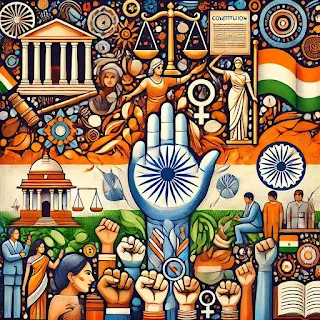JobAleart.in (jobalert)
As an Indian citizen, you are entitled to six Fundamental Rights guaranteed by the Constitution of India under Part III (Articles 12-35). These rights are essential for the development of individuals and democracy.
Six Fundamental Rights of Indian Citizens:
1. Right to Equality (Article 14-18)
Ensures equality before the law and prohibits discrimination on the grounds of religion, race, caste, sex, or place of birth.
Abolishes untouchability (Article 17) and titles (Article 18).
2. Right to Freedom (Article 19-22)
Article 19: Provides freedoms such as speech & expression, assembly, association, movement, residence, and profession.
Article 20: Protection from arbitrary conviction or punishment.
Article 21: Right to life and personal liberty.
Article 21A: Right to free and compulsory education (for children aged 6-14 years).
Article 22: Protection against arbitrary arrest and detention.
3. Right Against Exploitation (Article 23-24)
Prohibits human trafficking, forced labor, and bonded labor.
Bans the employment of children under 14 years in hazardous industries.
4. Right to Freedom of Religion (Article 25-28)
Ensures freedom of conscience and the right to freely practice, profess, and propagate any religion.
Prevents the government from interfering in religious affairs but allows regulation in matters like social reform.
5. Cultural and Educational Rights (Article 29-30)
Protects the rights of minorities to preserve their language, script, and culture.
Grants minorities the right to establish and administer their own educational institutions.
6. Right to Constitutional Remedies (Article 32-35)
Known as the "Heart and Soul of the Constitution" (Dr. B.R. Ambedkar).
Empowers citizens to approach the Supreme Court or High Courts to enforce their fundamental rights.

